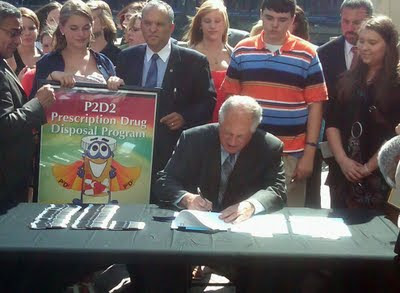Two bills signed by Governor Pat Quinn are going to make it much easier for people to properly dispose of their unused medicines. Improper storage and disposal of medicines can lead to unintentional poisonings, medicine diversion and misuse, and can negatively impact aquatic wildlife.
“One of the main road blocks to medicine collection programs is the cost of properly disposing of the materials once they are collected”, says Laura Kammin, IISG pollution prevention program specialist. “This legislation will help communities that could not previously afford to have a program to start new collection programs, and it will provide financial support for police departments that already have medicine collection programs in place. HB2056 will provide critical funding to keep medicines out of the water until a national funding program is put into place.”
On August 24, 2011, Governor Quinn signed two bills that will provide a major boost to unused medicine collection programs in Illinois. House Bill 2056, sponsored by Rep. JoAnn Osmond (R-Antioch) and Sen. Suzi Schmidt (R-Villa Park) will make it easier for police departments in Illinois to pay for medicine collection programs. The new law authorizes law enforcement agencies to collect pharmaceuticals from residents and provides the funding to support collection and proper incineration of the medicines. Costs associated with medicine collection can be recovered through a $20 court fee levied against people who commit specified drug offenses.
House Bill 3090, sponsored by Rep. Luis Arroyo (D-Chicago) and Sen. William Delgado (D-Chicago), authorizes the use of city halls or police departments to house medicine collection containers. Both laws go into effect on January 1, 2012.
“We don’t want these pharmaceuticals disposed of in an improper way. If they are just thrown down the toilet or thrown in the garbage they can end up in our water supply,” Governor Quinn said. “These bills will help Illinois conserve water, protect the safety of our drinking water supplies and ensure that unused medications are disposed of properly.”
Yesterday’s signing was actually the result of the hard work and enthusiasm of high school students. The Prescription Pill and Drug Disposal Program (P2D2), was launched by students at Pontiac Township High School and their ecology teacher, Paul Ritter. High school students from Antioch joined the program and brought the idea of a bill to fund household medicine disposal to Rep. Osmond.
“Through the hard work and dedication of students from Pontiac, Antioch, and other schools in the state of Illinois, and with the guidance of Illinois-Indiana Sea Grant, the P2D2 Bill [HB2056], which pays for the disposal of pharmaceuticals in Illinois, was signed by Governor Pat Quinn and become law,” said Ritter.
IISG and the P2D2 Program developed The Medicine Chest curriculum to educate other students around the country about proper disposal of medicines. And both organizations work together help communities start new medicine collection programs. For more information about how you can start a program in your community, contact Laura Kammin.


